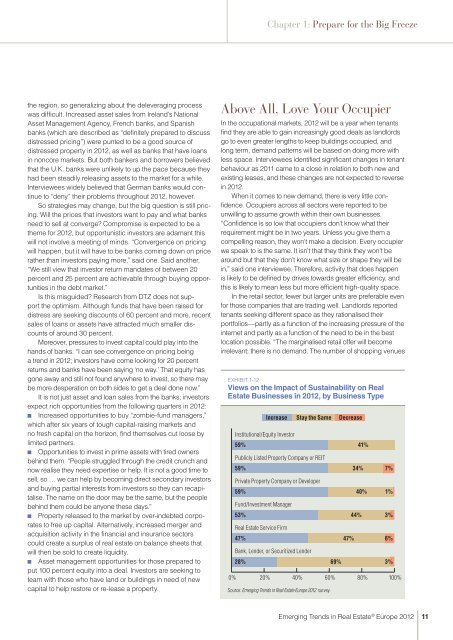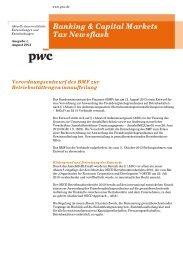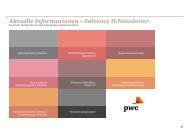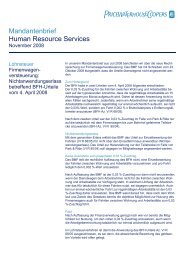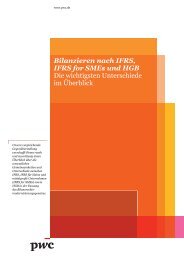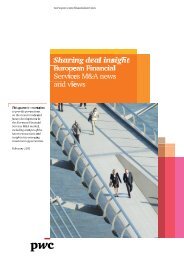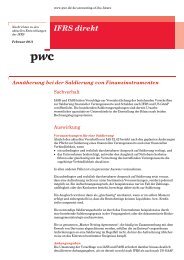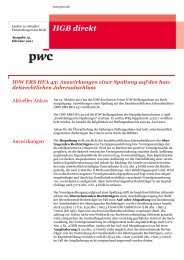Emerging Trends in Real Estate® Europe 2012 - PwC
Emerging Trends in Real Estate® Europe 2012 - PwC
Emerging Trends in Real Estate® Europe 2012 - PwC
You also want an ePaper? Increase the reach of your titles
YUMPU automatically turns print PDFs into web optimized ePapers that Google loves.
the region, so generaliz<strong>in</strong>g about the deleverag<strong>in</strong>g process<br />
was difficult. Increased asset sales from Ireland’s National<br />
Asset Management Agency, French banks, and Spanish<br />
banks (which are described as “def<strong>in</strong>itely prepared to discuss<br />
distressed pric<strong>in</strong>g”) were punted to be a good source of<br />
distressed property <strong>in</strong> <strong>2012</strong>, as well as banks that have loans<br />
<strong>in</strong> noncore markets. But both bankers and borrowers believed<br />
that the U.K. banks were unlikely to up the pace because they<br />
had been steadily releas<strong>in</strong>g assets to the market for a while.<br />
Interviewees widely believed that German banks would cont<strong>in</strong>ue<br />
to “deny” their problems throughout <strong>2012</strong>, however.<br />
So strategies may change, but the big question is still pric<strong>in</strong>g.<br />
Will the prices that <strong>in</strong>vestors want to pay and what banks<br />
need to sell at converge? Compromise is expected to be a<br />
theme for <strong>2012</strong>, but opportunistic <strong>in</strong>vestors are adamant this<br />
will not <strong>in</strong>volve a meet<strong>in</strong>g of m<strong>in</strong>ds. “Convergence on pric<strong>in</strong>g<br />
will happen, but it will have to be banks com<strong>in</strong>g down on price<br />
rather than <strong>in</strong>vestors pay<strong>in</strong>g more,” said one. Said another,<br />
“We still view that <strong>in</strong>vestor return mandates of between 20<br />
percent and 25 percent are achievable through buy<strong>in</strong>g opportunities<br />
<strong>in</strong> the debt market.”<br />
Is this misguided? Research from DTZ does not support<br />
the optimism. Although funds that have been raised for<br />
distress are seek<strong>in</strong>g discounts of 60 percent and more, recent<br />
sales of loans or assets have attracted much smaller discounts<br />
of around 30 percent.<br />
Moreover, pressures to <strong>in</strong>vest capital could play <strong>in</strong>to the<br />
hands of banks. “I can see convergence on pric<strong>in</strong>g be<strong>in</strong>g<br />
a trend <strong>in</strong> <strong>2012</strong>; <strong>in</strong>vestors have come look<strong>in</strong>g for 20 percent<br />
returns and banks have been say<strong>in</strong>g ‘no way.’ That equity has<br />
gone away and still not found anywhere to <strong>in</strong>vest, so there may<br />
be more desperation on both sides to get a deal done now.”<br />
It is not just asset and loan sales from the banks; <strong>in</strong>vestors<br />
expect rich opportunities from the follow<strong>in</strong>g quarters <strong>in</strong> <strong>2012</strong>:<br />
■■<br />
Increased opportunities to buy “zombie-fund managers,”<br />
which after six years of tough capital-rais<strong>in</strong>g markets and<br />
no fresh capital on the horizon, f<strong>in</strong>d themselves cut loose by<br />
limited partners.<br />
■■<br />
Opportunities to <strong>in</strong>vest <strong>in</strong> prime assets with tired owners<br />
beh<strong>in</strong>d them. “People struggled through the credit crunch and<br />
now realise they need expertise or help. It is not a good time to<br />
sell, so … we can help by becom<strong>in</strong>g direct secondary <strong>in</strong>vestors<br />
and buy<strong>in</strong>g partial <strong>in</strong>terests from <strong>in</strong>vestors so they can recapitalise.<br />
The name on the door may be the same, but the people<br />
beh<strong>in</strong>d them could be anyone these days.”<br />
■■<br />
Property released to the market by over-<strong>in</strong>debted corporates<br />
to free up capital. Alternatively, <strong>in</strong>creased merger and<br />
acquisition activity <strong>in</strong> the f<strong>in</strong>ancial and <strong>in</strong>surance sectors<br />
could create a surplus of real estate on balance sheets that<br />
will then be sold to create liquidity.<br />
■■<br />
Asset management opportunities for those prepared to<br />
put 100 percent equity <strong>in</strong>to a deal. Investors are seek<strong>in</strong>g to<br />
team with those who have land or build<strong>in</strong>gs <strong>in</strong> need of new<br />
capital to help restore or re-lease a property.<br />
Chapter 1: Prepare for the Big Freeze<br />
Above All, Love Your Occupier<br />
In the occupational markets, <strong>2012</strong> will be a year when tenants<br />
f<strong>in</strong>d they are able to ga<strong>in</strong> <strong>in</strong>creas<strong>in</strong>gly good deals as landlords<br />
go to even greater lengths to keep build<strong>in</strong>gs occupied, and<br />
long term, demand patterns will be based on do<strong>in</strong>g more with<br />
less space. Interviewees identified significant changes <strong>in</strong> tenant<br />
behaviour as 2011 came to a close <strong>in</strong> relation to both new and<br />
exist<strong>in</strong>g leases, and these changes are not expected to reverse<br />
<strong>in</strong> <strong>2012</strong>.<br />
When it comes to new demand, there is very little confidence.<br />
Occupiers across all sectors were reported to be<br />
unwill<strong>in</strong>g to assume growth with<strong>in</strong> their own bus<strong>in</strong>esses.<br />
“Confidence is so low that occupiers don’t know what their<br />
requirement might be <strong>in</strong> two years. Unless you give them a<br />
compell<strong>in</strong>g reason, they won’t make a decision. Every occupier<br />
we speak to is the same. It isn’t that they th<strong>in</strong>k they won’t be<br />
around but that they don’t know what size or shape they will be<br />
<strong>in</strong>,” said one <strong>in</strong>terviewee. Therefore, activity that does happen<br />
is likely to be def<strong>in</strong>ed by drives towards greater efficiency, and<br />
this is likely to mean less but more efficient high-quality space.<br />
In the retail sector, fewer but larger units are preferable even<br />
for those companies that are trad<strong>in</strong>g well. Landlords reported<br />
tenants seek<strong>in</strong>g different space as they rationalised their<br />
portfolios—partly as a function of the <strong>in</strong>creas<strong>in</strong>g pressure of the<br />
<strong>in</strong>ternet and partly as a function of the need to be <strong>in</strong> the best<br />
location possible. “The marg<strong>in</strong>alised retail offer will become<br />
irrelevant; there is no demand. The number of shopp<strong>in</strong>g venues<br />
ExHIBIT 1-12<br />
Views on the Impact of Susta<strong>in</strong>ability on <strong>Real</strong><br />
Estate Bus<strong>in</strong>esses <strong>in</strong> <strong>2012</strong>, by Bus<strong>in</strong>ess Type<br />
Institutional/Equity Investor<br />
Increase Stay the Same Decrease<br />
59% 41%<br />
Publicly Listed Property Company or REIT<br />
59% 34% 7%<br />
Private Property Company or Developer<br />
59% 40% 1%<br />
Fund/Investment Manager<br />
53% 44% 3%<br />
<strong>Real</strong> Estate Service Firm<br />
47% 47% 6%<br />
Bank, Lender, or Securitized Lender<br />
28% 69% 3%<br />
0% 20% 40% 60% 80% 100%<br />
Source: <strong>Emerg<strong>in</strong>g</strong> <strong>Trends</strong> <strong>in</strong> <strong>Real</strong> Estate <strong>Europe</strong> <strong>2012</strong> survey.<br />
<strong>Emerg<strong>in</strong>g</strong> <strong>Trends</strong> <strong>in</strong> <strong>Real</strong> Estate ® <strong>Europe</strong> <strong>2012</strong><br />
11


